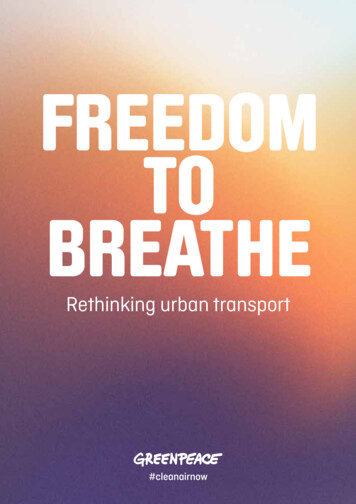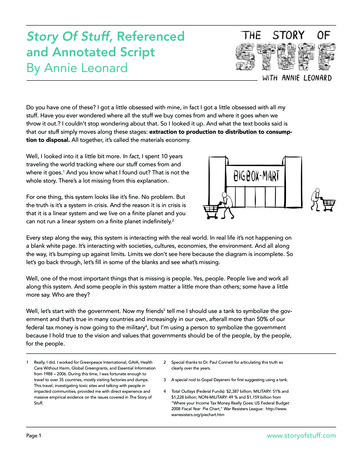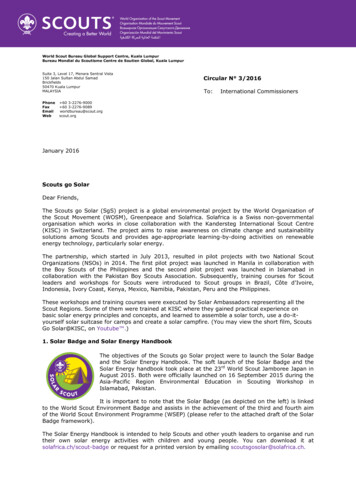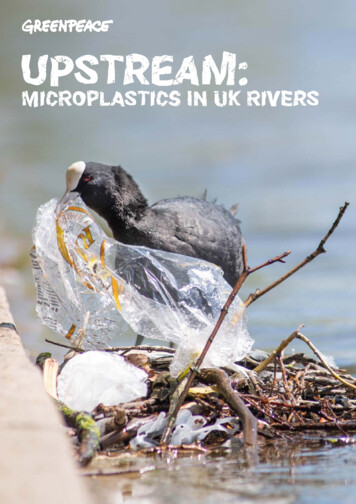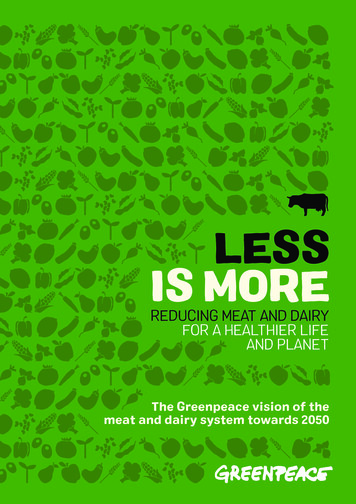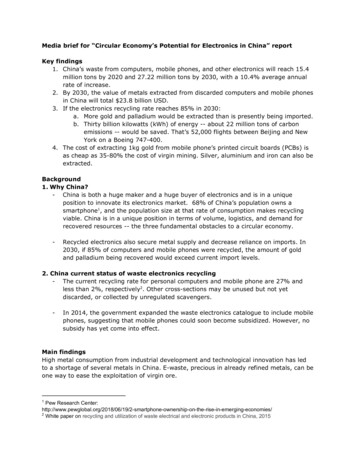
Transcription
Media brief for “Circular Economy’s Potential for Electronics in China” reportKey findings1. China’s waste from computers, mobile phones, and other electronics will reach 15.4million tons by 2020 and 27.22 million tons by 2030, with a 10.4% average annualrate of increase.2. By 2030, the value of metals extracted from discarded computers and mobile phonesin China will total 23.8 billion USD.3. If the electronics recycling rate reaches 85% in 2030:a. More gold and palladium would be extracted than is presently being imported.b. Thirty billion kilowatts (kWh) of energy -- about 22 million tons of carbonemissions -- would be saved. That’s 52,000 flights between Beijing and NewYork on a Boeing 747-400.4. The cost of extracting 1kg gold from mobile phone’s printed circuit boards (PCBs) isas cheap as 35-80% the cost of virgin mining. Silver, aluminium and iron can also beextracted.Background1. Why China?- China is both a huge maker and a huge buyer of electronics and is in a uniqueposition to innovate its electronics market. 68% of China’s population owns asmartphone1, and the population size at that rate of consumption makes recyclingviable. China is in a unique position in terms of volume, logistics, and demand forrecovered resources -- the three fundamental obstacles to a circular economy.-Recycled electronics also secure metal supply and decrease reliance on imports. In2030, if 85% of computers and mobile phones were recycled, the amount of goldand palladium being recovered would exceed current import levels.2. China current status of waste electronics recycling- The current recycling rate for personal computers and mobile phone are 27% andless than 2%, respectively2. Other cross-sections may be unused but not yetdiscarded, or collected by unregulated scavengers.-In 2014, the government expanded the waste electronics catalogue to include mobilephones, suggesting that mobile phones could soon become subsidized. However, nosubsidy has yet come into effect.Main findingsHigh metal consumption from industrial development and technological innovation has ledto a shortage of several metals in China. E-waste, precious in already refined metals, can beone way to ease the exploitation of virgin ore. Pew Research 2 White paper on recycling and utilization of waste electrical and electronic products in China, 20151
-The potential value of the three main types of e-waste in China (mobile phone,laptop and PC) has increased from 13.5 billion yuan ( 2.0 billion USD) in 2010 to 80billion yuan ( 11.9 billion USD) in 2019. By 2030, this number will double.-One ton of printed circuit boards (PCBs) can yield 0.8-1.5 kg gold3gold ore, however, only yields .020 - .1 kg.4 5. One ton ofOur calculations show that the cost of extracting 1kg gold from PCBs is87,000-200,000 yuan ( 12,954 - 29,781) which is lower than the cost of extracting1kg gold from gold ore, which on average costs 250,000 yuan ( 37,230). Moreover,several kinds of metals, like iron, aluminium and silver can be refined by urbanmining6, while virgin mining only produces one or two types of metal in single set ofprocesses.-To gage the economic potential of urban mining in China in the near future, weprojected three different scenarios for e-waste recycling in China. Scenario 1 - Business as usual : By the end of 2030, the e-waste recyclingrate in China remains unchanged (27% for PC, 2% for mobile phone)Scenario 2 - US 2014 target : By the end of 2030, the e-waste recycling ratein China is on par with the United States’ rate in 2014 (62% for PC, 33% formobile phone)Scenario 3 - EU 2019 target : By the end of 2030, the e-waste recycling rate inChina reaches the European Union’s target rate for 2019 (85% for PC, 85% formobile phone) Chancerel, P., Meskers, C. E. M., Hageluken, C., & Rotter, V. S. (2009). Assessment of Precious Metal FlowsDuring Preprocessing of Waste Electrical and Electronic Equipment. Journal of Industrial Ecology, 13(5), 791–8104Maryam, G., Maria, R., Bijan, S.(2018). Investigation into the Recovery of Valuable Metals from Waste MobilePhone Printed Circuit Boards (PCBs): An Australian Case Study. International Journal of Waste Resources, 8(358)5 Oguchi, M., Murakami, S., Sakanakura, H., Kida, A., & Kameya, T. 2011. A preliminary categorization of end-of-lifeelectrical and electronic equipment as secondary metal resources. Waste Management , 31(9-10), 2150–21606 Recycle valuable metals from a large number of waste electrical appliances3
A higher recycling rate clearly shows greater productivity, and greater economic benefits.For key metals, like gold, silver, copper, and palladium, this productivity is particularlysignificant.-If China’s e-waste recycling rate reaches the EU 2019 target (85% for PC, 85% formobile phone), the energy conservation through urban mining will be around 30billion kWh, and the offset carbon emissions will equate to 22 million tons less than ifthat metal were virgin mined. That's the equivalent of 52,000 flights between Beijingand New York on a Boeing 747-400 plane7.Greenpeace calls for:1. Boost the recycling rate and slow down the replacement rate for electronic products.2. Governments, brands, and financiers should invest in the urban mining industry. Thisis crucial to let the industry scale up.3. Industry and government should work together to provide reliable and transparentdata of the recycling market and stock flow, such as sales analysis and projection,and geographic data on regional rates and movement of recyclables. This gives7 Christian, N. J. (2009). Calculating The Carbon Dioxide Emissions of Flights. Oxford University.
investors the confidence to make sensible business decisions and helps industryplayers to operate more efficiently.4. Electronics manufacturers and brands should focus on design, and make productsmore durable, repairable, and recyclable.5. Establish industry frameworks and standards to ensure quality of work.Greenpeace East Asia has been campaigning since 2016 for the electronics sector to reducethe consumption of resources and transform into a circular production model. Since 2003,we have focused on e-waste in China. The organization will continue engaging differentstakeholders to speed up China's transition to a more viable model.AppendixMethodologyAs precious metals like gold, silver, and palladium mainly exist in PCBs of e-waste, and theprice of these precious metals are much higher than that of other materials. This analysisfocuses on PCBs.1. The potential value of e-waste recycling in China from 2010 to 2030 was described as:The value of the metals in PCBs PC, laptop, or mobile e-waste Σ(The weight of thee-waste8 * the proportional amount of PCB per weighted unit of e-waste * the total metalcontent of PCBs9 * the price of those metals10)2 . PCBs from mobile phones were used as an example to calculate the cost of PCB recycling.According to the market price, 50,000-60,000 yuan/ton is the average acquisition price ofPCBs in mobile phones (the cost of mobile phone acquisition and dismantling is included)and the cost distribution of PCB processing is shown below11.8Zeng, X., Gong, R., Chen, W.-Q., & Li, J. 2016. Uncovering the Recycling Potential of “New” WEEE in China.Environmental Science & Technology, 50(3), 1347–1358.9 Duan, H., Hu, J., Tan, Q., Liu, L., Wang, Y., & Li, J. 2016. Systematic characterization of generation andmanagement of e-waste in China. Environmental Science and Pollution Research International, 23(2), 1929–194310 http://www.infomine.com11 Cucchiella, F., D’Adamo, I., Lenny Koh, S. C., & Rosa, P. 2016. A profitability assessment of European recyclingprocesses treating printed circuit boards from waste electrical and electronic equipments. Renewable andSustainable Energy Reviews, 64, 749–760 .
The cost of metal refinery from PCBs the average acquisition price of PCBs in mobilephones/the cost proportion of PCB acquisition
Our calculations show that the cost of extracting 1kg gold from PCBs is 87,000-200,000 yuan ( 12,954 - 29,781) which is lower than the cost of extracting 1kg gold from gold ore, which on average costs 250,000 yuan ( 37,230). Moreover, several kinds of metals, like iron, aluminium and silver can be refined by urban
